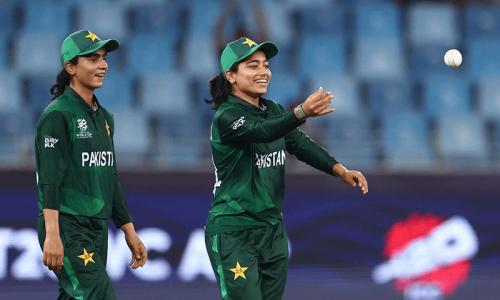Yet many women contributed to the struggle for Pakistan and the rights of women and fought for freedom. They have gone down in history as pioneers and are remembered for their untiring efforts. They encouraged their men to make sacrifices, organised meetings and rallies and also spread the cause internationally for an independent state. The contributions of some of these extraordinary women will make all women proud in times to come.
The first name that comes to mind is that of Miss Fatima Jinnah who was always at her brother's side and the Quaid relied on her for many aspects of women's rights and politics. Along with her, Begum Mohammad Ali Johar, Begum Shah Nawaz and her daughter Mumtaz Shah Nawaz, Lady Abdullah Haroon, Begum Salma Tassaduque Hussain and Begum Rana Liaquat Ali Khan, Begum Shaista Ikramullah, are prominent personalities who spread the word of a free land and its movement.
Mohtarma Fatima Jinnah, also known as Madar-i-Millat (mother of the nation), took charge of her brother's household after the death of his wife. On that, the Quaid is known to have remarked, “My sister was like a bright ray of hope whenever I came back home and met her. Anxieties would have been much greater and my health much worse, but for the restraint imposed by her.”
The Muslim League passed a resolution in 1932 giving Muslim women complete equality in politics. Quaid-i-Azam stated “No nation can rise to the height of glory unless your women are side by side with you; we are victims of evil customs. It is a crime against humanity that our women are shut up within the four walls of the houses as prisoners. There is no sanction anywhere for the deplorable condition in which our women have to live.” (Pakistan — A Country Study, US Library of Congress). And to prove this, he kept his sister Mohtarma Fatima Jinnah always by his side. She also organised the All India Muslim Women Students Federation.
Another prominent name in the history of Pakistan is that of Begum Rana Liaquat Ali Khan. She was not only the wife of the first Prime Minister of Pakistan but also a great leader in her own regard. She encouraged political workers and brought about a great change for women by bringing them to the forefront to obtain the rightful status in society. She accompanied her husband to London in 1933 to request the Quaid to come back to lead the Muslims in India. In 1947, when the refugees began to pour in from across the border, she organised women to come forward with supplies and medical aid.
Muslim League activists like Begum Shaista Ikramullah — the first Muslim woman to obtain a PhD — and Abida Sultan — the third woman pilot of the Islamic world — were among the first ones to shun the age-old concept of being confined within the four walls and became extremely important for the freedom struggle.
On Quaid's call women came out from all over to take part in rallies and meetings. Begum Jahanara Shahnawaz was the first woman in Asia to preside over a legislative session. She was of the opinion that women have to be educated and economically independent. Her daughter Mumtaz Shahnawaz who was a great poet and writer, died in a plane crash at the age of 35 on her way to New York to represent Pakistan at the United Nations General Assembly. It was her house that was the main place for canvassing and meetings during the struggle. Amongst her admirers were Sarojini Naidu and George Bernard Shaw.
Begum Shaista Ikramullah, born in the well-known Surhrawardy family, organised the Muslim Girl Student Federation. Begum Shaista Ikramullah was the first female representative of the first Constituent Assembly of Pakistan in 1947. She was also the first Muslim woman to obtain a doctorate from the University of London in 1940. She was asked by the government of India in 1945 to attend the Pacific Relations conference but on Quaid-i-Azam's request she declined the offer and became a representative of the Muslim League and played an active role in the Pakistan Movement.
Women's branch of the Muslim League informed the common women about the politics of the country. They organised public meetings for women and addressed large gatherings. Inspired by them many women came to the forefront to play their role.
Among them was a brave worker of the Muslim League, named Sughra Bi Bi, who had the audacity to jump over the secretariat gate and hoist the Muslim League flag in place of the British flag at the peak of the civil disobedience movement. Many women faced lathi-charge and were put behind bars for their activism.
It is anyone's guess why the women involved in the Pakistan Movement have not been given due share in recognition of their efforts, as they worked side by side with the men.















































